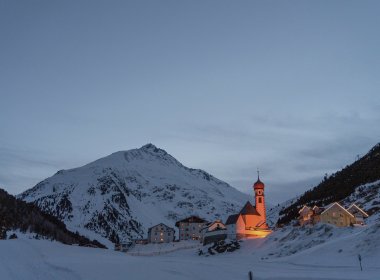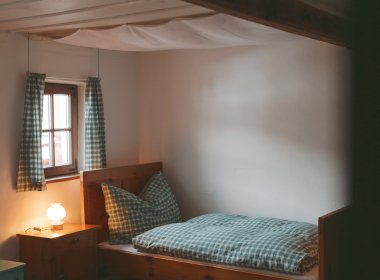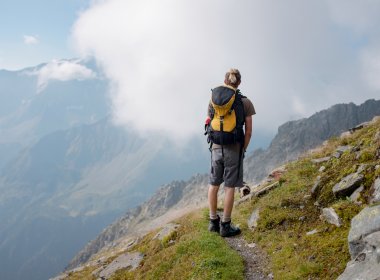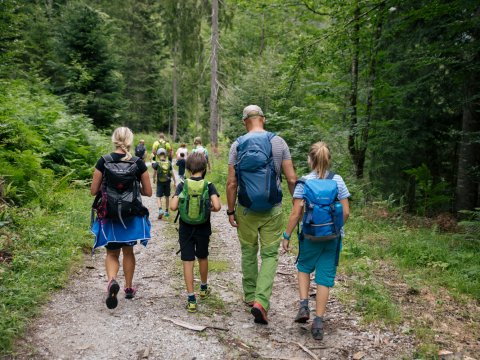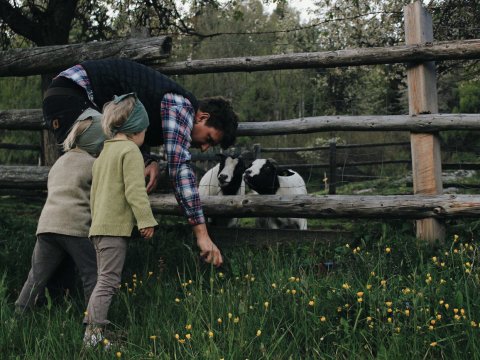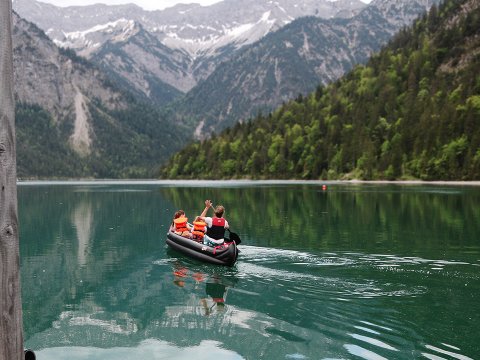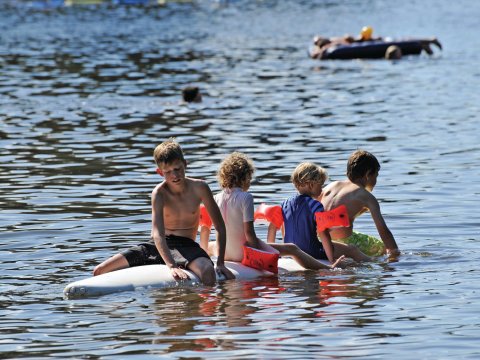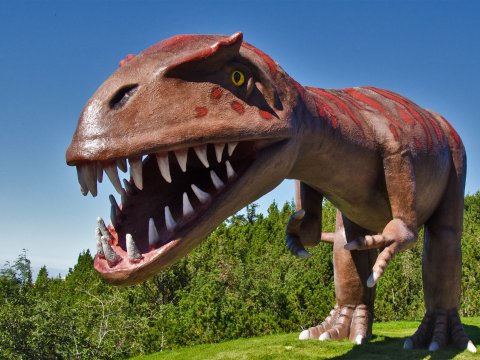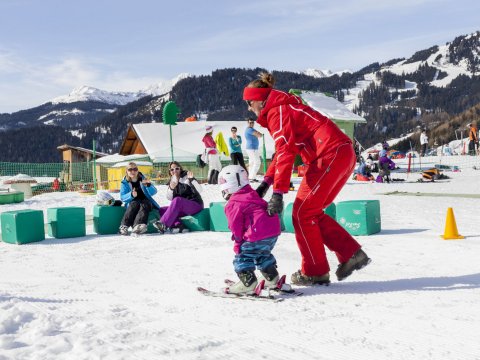Farm insight: all under one roof

The Falschlunger family has been running a farm in Mutters for generations – and they live closely together with the livestock for reasons of space alone. The proximity between people and animals ensures calmness and contentment – and shows why these small farms must remain.
The nest on the whitewashed wall is still empty. The migratory birds haven’t returned from Africa yet and there are no swallows buzzing around the barn. While Klaus Falschlunger is loading the manure into the wheelbarrow, his father Andreas is distributing the hay in the feeding areas. As they pass by, the men automatically place their hands on the cows' large bodies. Their handling of the animals is familiar, almost tender.
There isn't much space in the old barn, even though it’s a little bit lighter since the last renovation. The two slim organic farmers squeeze in between the Tirolean Grey cattle for milking. They have to be careful because the cows have horns. "You almost only see that in advertising these days," says Andreas, who looks like a Western hero with his moustache. Andreas, who is 65 years old, and Klaus, 38, routinely work side by side. In silence and relaxed. They tend to talk to the animals rather than to each other. "Come on Silva, move a little."
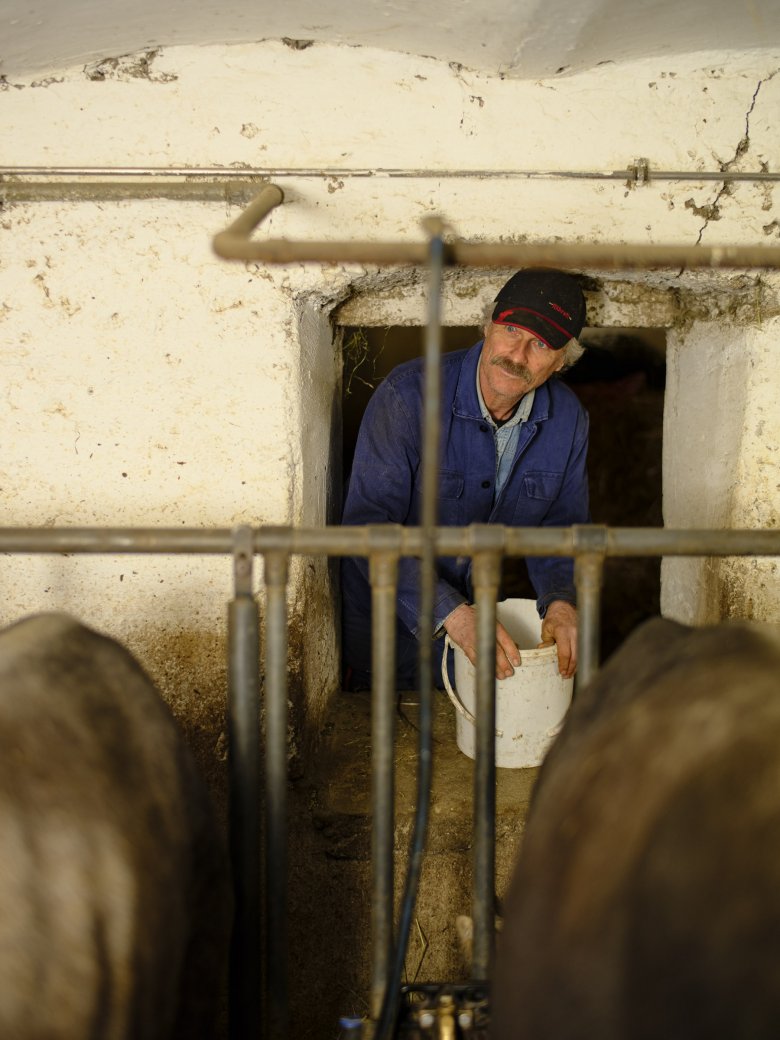
It's shortly after 6 pm. Carina, 36, Klaus' wife, marches through the shed in her wellies to fill the horses' feed sacks. Their shelters are just behind the farmhouse. Six-year-old Michael feeds his rabbits, Peter and Olivia, in the garden. "Peter is actually a girl," says Michael, "but we didn't know that when we baptised the rabbits."
His sister Marie, who is three years older than him, is leading two calves into the barn, a small bull with a coat the colour of light eggshells and the brown spotted one. At first, the two calves frolic around, but they soon squeeze in next to their mothers to drink. The farmers give up a few litres of milk for the health and happiness of their animals. This is called mother-supported calf rearing. It would be cheaper to supply the calves with milk powder. "The cows are like family to us," says Klaus, "so we like to give them time and closeness with their calves." Like in the commercials. But this is real life.
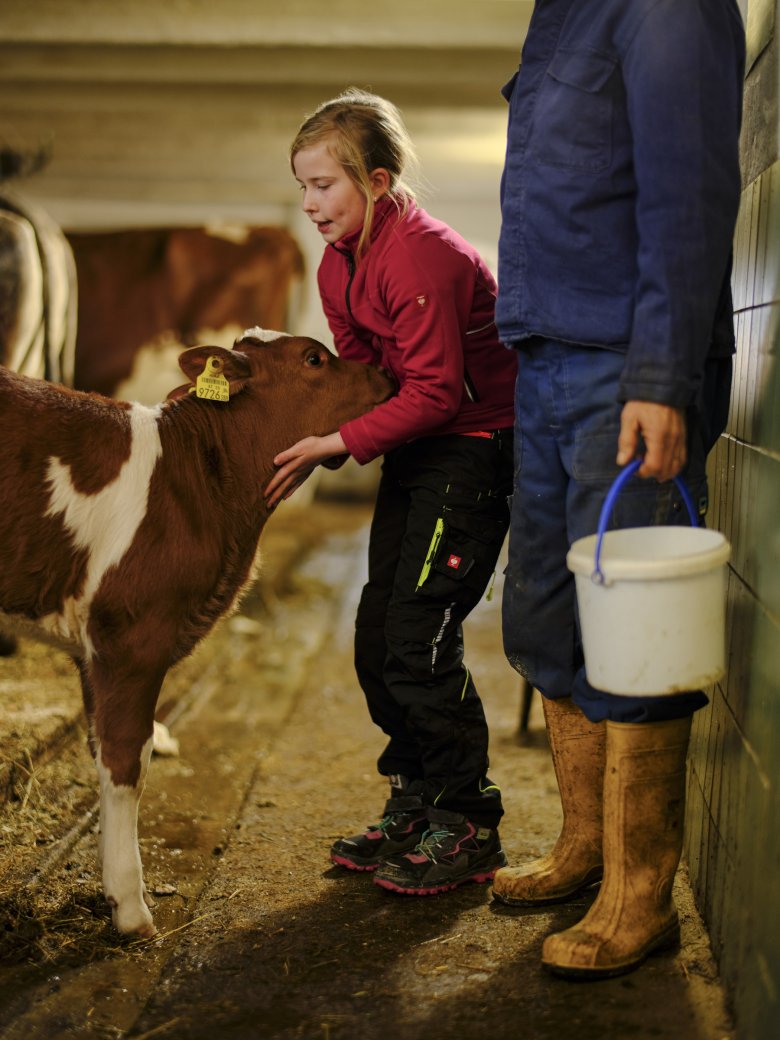
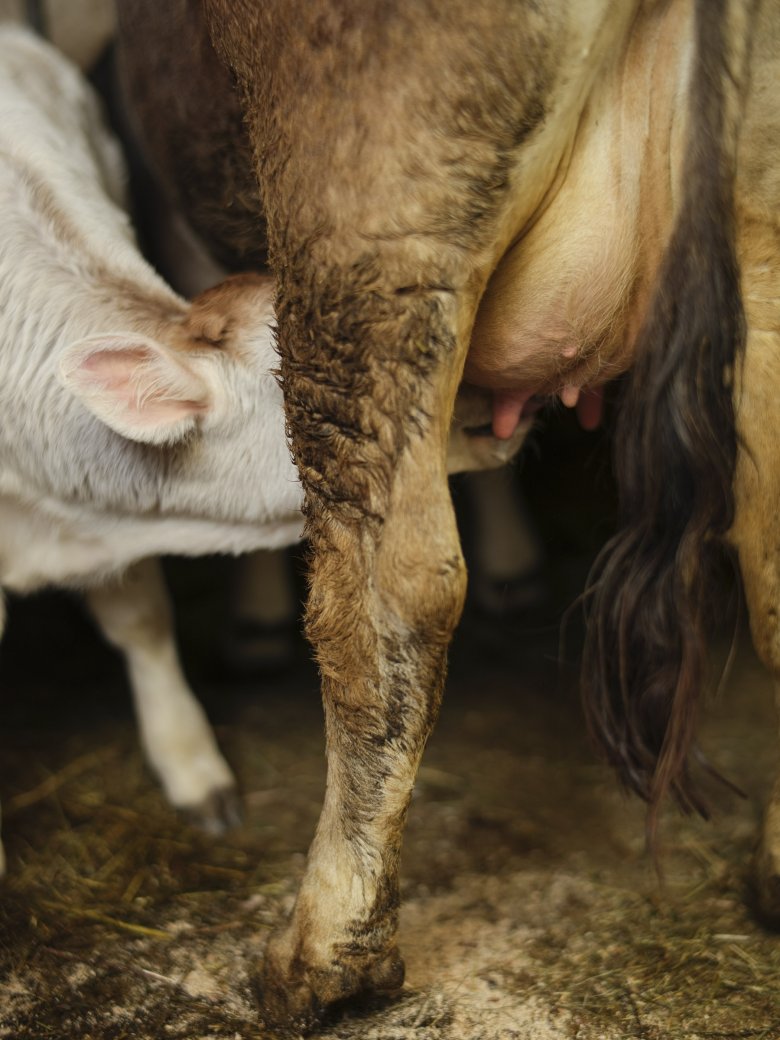
There are 14,215 agricultural and forestry businesses in Tirol. Although there are almost one million hectares of agricultural land, the narrow valleys and steep slopes mean that there are hardly any large fields – and few large farms as a result. 85 percent of Tirolean farms are family-run – and 56 percent are part-time farms. Because the yield from fields and livestock is often not enough. Because living in the rhythm of nature and close to the animals is still a way of life for many families. Or as Klaus puts it: "Because producing food is simply a wonderful job."

The Falschlunger family in Mutters are also part-time farmers, cultivating 4 hectares of grassland, 2 hectares of farmland and 1 hectare of forest. Klaus works 25 hours a week in the administration department at the Physics Institute in nearby Innsbruck, while Carina is a qualified nurse. Without this additional income, they wouldn’t be able to keep the farm going. "That's precisely why we do things the way we think is right", says Klaus.

His father Andreas also stopped working as a full-time farmer and worked at a local bank until recently, while his mother Martha, 64, was a teacher and later organised programmes for school classes and children's birthday parties on the farm: "That was excellent extra income for us for many years."
They all do the farm work together, even though everyone has their own area of responsibility. The family invests around 65 working hours a week. Martha is responsible for the 50 chickens and the pygmy goats, Carina looks after the horses, the seven bee colonies, the farm shop and the two holiday apartments, and the men do the dairy farming and feed the Duroc pigs with undersized potatoes from their own field and whey. The two or three pigs that wallow next to the chicken coop are bought every spring and slaughtered in winter. There are seven dairy cows in the Falschlunger barn. Five Tirolean Grey cattle and two Holsteins, which Klaus calls ‘adopted cows’. One was given to his sister as a school graduation present and the other one is a survivor of a gas explosion that destroyed a barn in the Wipptal valley.
The fact that the Falschlungers are not interested in profit is also evident in their sympathy for the traditional but less profitable Grey cattle. "Our Grey cattle are more spirited and healthier, and they live longer," explains Andreas. "They sometimes roughhouse and play with each other. The Holstein dairy machines just eat all day long." But all the cows have one thing in common: Lucy, Emmi, Silva, Stella, Lieselotte, Anja and Lilly have not been fed silage for a few years now. Their diet consists only of green fodder, hay and a little grain. Since then, the hay milk tastes even better and is healthier too. And since this change, it no longer smells of fermented grass in the Falschlunger barn. "That's a huge advantage," says Carina, "especially when you live under one roof with the cows like we do."
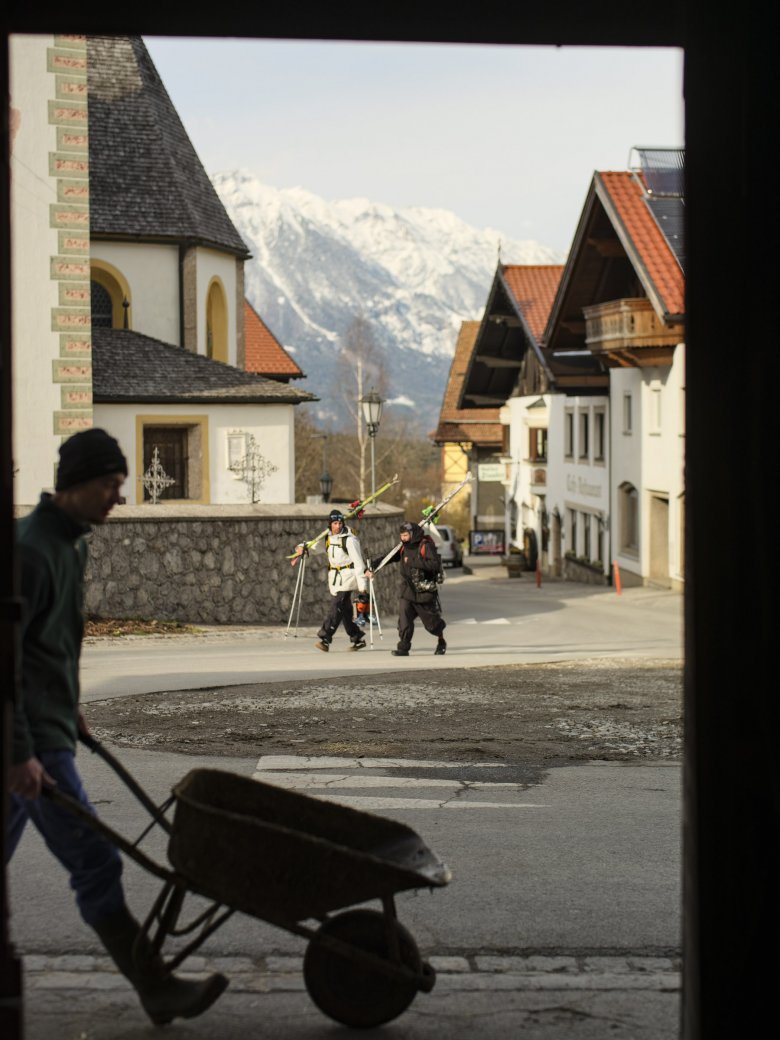
In the past, it was common for many people to share a building with their livestock. Today, such farms have become rare. At least in Central Europe. Intensive farming has moved the animals into large, often fully automated barns. But when you have a hundred cows or even more, you stop giving them names and you don't have time to stroke their coats as a matter of course. Every member of the Falschlunger family knows that "Lieselotte is a quiet, rather solitary cow". And they all know which chickens grumble the loudest when being mucked out. "And it also has its advantages," says Andreas, "that Martha and I have our bedroom directly above the barn. We can hear when a cow has a calf in the night and can go downstairs straight away." Thanks to the Alpine topography and perhaps also the rather gnarled nature of the people, small-scale farming has survived in Tirol despite being threatened with extinction otherwise in the modern age. Although it doesn’t necessarily pay well, many people still consider it valuable and worth preserving. The Mesneranderlhof is located in the village centre of Mutters at the entrance to the Stubai Valley and "was first mentioned in a document in 1299", as Andreas proudly recounts. A copy of the document hangs in the hallway next to the cowbells. Since 1766, the Falschlunger family has been living in the stately building, which is located between the parish church and the music school, surrounded by farms but also by new buildings, car parks, glass and concrete. The properties in the community with 2,285 inhabitants are close together. After all, the pretty village is part of the Innsbruck suburbs. Very few of the Falschlungers' neighbours are farmers themselves. But most of them like the fact that there are still animals in the village and that food is produced locally here. On their way to school, the children pass the meadow behind the house where the cows graze in the warmer months. And anyone heading to the municipal office will inevitably come across residents of the Mesneranderlhof farm. Many stop to stroke Sakura, the Friesian mare, or to watch Blacky, the pony, and Seiser, the Haflinger, at least for a little while. You can also book riding lessons and learn how people and horses should treat each other while having fun.
But of course, farming with cows, pigs and chickens is anything but easy. One day, the animals are killed. "We have our cows slaughtered around the corner in Axams," says Klaus. Although the facility is a little further away than the nearest abattoir, it’s smaller and therefore more personal. As a farmer, you can still go in and be there when the cow or calf is killed: "It's never nice when the animal is slaughtered but seeing it through to the end is the best thing you can do."
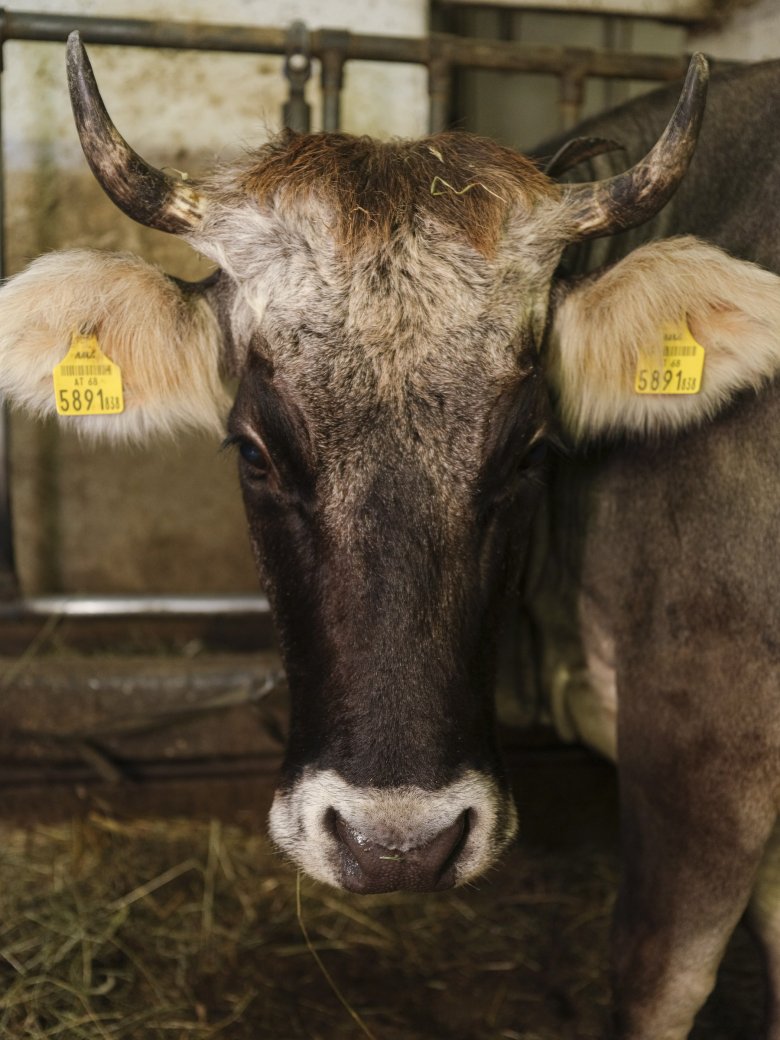
The Falschlungers care about the welfare of their animals as much as possible. And as organic farmers, they want to play a positive role in nature and landscape conservation. "If you’re a beekeeper or you keep your pigs outside, you're not doing it for the money," says Carina.
She is genuinely concerned about the extinction of species, climate change and the disappearance of farms. "The situation for many farmers is dramatic," she says. The figures confirm her view. Between 2010 and 2021, 1,387 farms were closed down in Tirol. Every year, there are fewer and fewer still standing. For the Falschlungers, this is no reason to give up. On the contrary. "We have to break new ground and show that things can be done differently," says Carina.
For their family, the farm doubles up as a platform for all kinds of experiments and projects. And the Falschlungers have plenty of ideas and projects: a foil tunnel, optimising the area for the free-range pigs and perhaps a new cowshed at some point. It’s now 7.30 pm. Andreas and Martha walk down to the chickens and pygmy goats with the wheelbarrow. This enclosure and the family's vegetable garden are 250 metres from the house on the outskirts of the village, right next to the tracks of the regional tram. "It's often so noisy in the village," says Martha, "and when I come here, it's a real paradise for me."
She remembers the tram driver calling them one evening because he had noticed something as he was passing by: "Why don't you look down at your chickens again… I think you’ve forgotten to close the barn door." And then Martha says something that her family exemplifies: "The coexistence of humans and animals works well when things are also just right between the people.”










